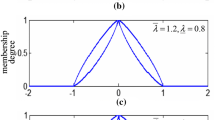Abstract
In this paper, a fuzzy-identification-based adaptive backstepping control (FABC) scheme is proposed. The FABC system is composed of a backstepping controller and a robust controller. The backstepping controller, which uses a self-organizing fuzzy system (SFS) with the structure and parameter learning phases to on-line estimate the controlled system dynamics, is the principal controller, and the robust controller is designed to dispel the effect of approximation error introduced by the SFS. The developed SFS automatically generates and prunes the fuzzy rules by the proposed structure adaptation algorithm and the parameters of the fuzzy rules and membership functions tunes on-line in the Lyapunov sense. Thus, the overall closed-loop FABC system can guarantee that the tracking error and parameter estimation error are uniformly ultimately bounded; and the tracking error converges to a desired small neighborhood around zero. Finally, the proposed FABC system is applied to a chaotic dynamic system to show its effectiveness. The simulation results verify that the proposed FABC system can achieve favorable tracking performance even with unknown controlled system dynamics.












Similar content being viewed by others
Explore related subjects
Discover the latest articles, news and stories from top researchers in related subjects.References
Chen G, Dong X (1993) On feedback control of chaotic continuous-time systems. IEEE Trans Circuits Syst I 40(9):591–601
Gao Y, Er MJ (2003) Online adaptive fuzzy neural identification and control of a class of MIMO nonlinear systems. IEEE Trans Fuzzy Syst 11(4):462–477
Hsu CF (2007) Self-organizing adaptive fuzzy neural control for a class of nonlinear systems. IEEE Trans Neural Netw 18(4):1232–1241
Hsu CF, Lin CM, Lee TT (2006) Wavelet adaptive backstepping control for a class of nonlinear systems. IEEE Trans Neural Netw 17(5):1175–1183
Kim N, Calise AJ (2007) Several extensions in methods for adaptive output feedback control. IEEE Trans Neural Netw 18(2):482–494
Leng G, McGinnity TM, Prasad G (2005) An approach for on-line extraction of fuzzy rules using a self-organizing fuzzy neural network. Fuzzy Set Syst 150:211–243
Leu YG, Wang WY, Lee TT (2005) Observer-based direct adaptive fuzzy-neural control for nonaffine nonlinear systems. IEEE Trans Neural Netw 16(4):853–861
Lin CK (2002) Adaptive tracking controller design for robotic systems using Gaussian wavelet networks. IEE Proc Contr Theory Appl 149(4):316–322
Lin CM, Hsu CF (2002) Guidance law design by adaptive fuzzy sliding-mode control. J Guid Control Dyn 25(2):248–256
Lin CT, Cheng WC, Liang SF (2005) An on-line ICA-mixture-model-based self-constructing fuzzy neural network. IEEE Trans Circuits Syst I 52(1):207–221
Lin FJ, Lin CH, Shen PH (2001) Self-constructing fuzzy neural network speed controller for permanent-magnet synchronous motor drive. IEEE Trans Fuzzy Syst 9(5):751–759
Loria A, Panteley E, Nijmeijer H (1998) Control of the chaotic Duffing equation with uncertainty in all parameters. IEEE Trans Circuits Syst I 45(6):1252–1255
Pal NR, Pal T (1999) On rule pruning using fuzzy neural networks. Fuzzy Sets Syst 106(3):335–347
Park JH, Seo SJ, Park GT (2003) Robust adaptive fuzzy controller for nonlinear system using estimation of bounds for approximation errors. Fuzzy Set Syst 133:19–36
Park JH, Park GT, Kim SH, Moon CJ (2005) Output-feedback control of uncertain nonlinear systems using a self-structuring adaptive fuzzy observer. Fuzzy Set Syst 151:21–42
Slotine JJE, Li WP (1991) Applied nonlinear control. Prentice Hall, Englewood Cliffs
Timothy JR (1995) Fuzzy logic with engineering application. McGraw-Hill, New York
Wang C, Hill DJ (2006) Learning from neural control. IEEE Trans Neural Netw 17(1):130–146
Wang LX (1994) Adaptive fuzzy systems and control: design and stability analysis. Prentice-Hall, Englewood Cliffs
Wang LX (1997) A course in fuzzy systems and control. Prentice-Hall, New Jersey
Wang SD, Lin CK (2000) Adaptive tuning of the fuzzy controller for robots. Fuzzy Set Syst 110:351–363
Acknowledgments
The authors appreciate the partial financial support from the National Science Council of Republic of China under grant NSC 96-2218-E-216-001. The authors would like to express their gratitude to the Reviewers for their valuable comments and suggestions.
Author information
Authors and Affiliations
Corresponding author
Rights and permissions
About this article
Cite this article
Chen, PC., Hsu, CF., Lee, TT. et al. Fuzzy-identification-based adaptive backstepping control using a self-organizing fuzzy system. Soft Comput 13, 635–647 (2009). https://doi.org/10.1007/s00500-008-0370-4
Published:
Issue Date:
DOI: https://doi.org/10.1007/s00500-008-0370-4




